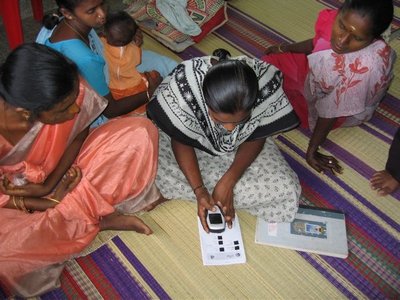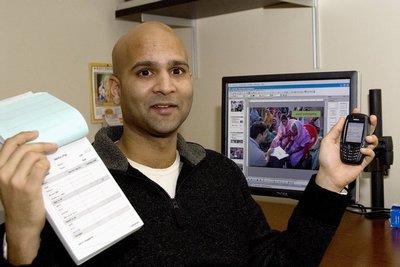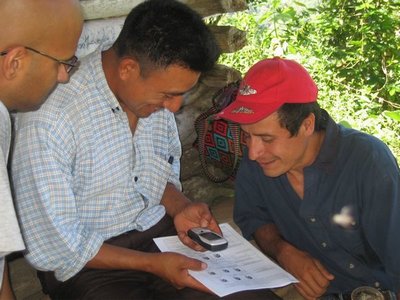February 28, 2007
Custom cell phones for microfinance co-ops, fair-trade coffee growers
Bill Gates made his fortune in computer science by building the Microsoft software empire. Then, in 2006, Gates decided to devote his money and energy to helping the developing world. Tapan Parikh also is a computer scientist, based in Seattle, whose passion is global justice.
But rather than abandoning his high-tech career to pursue philanthropic work, Parikh is part of a new movement that applies computer science tools to global issues. A doctoral student in the UW’s Department of Computer Science & Engineering, he has modified a cell phone for use in the developing world. His first clients are microfinance borrowers and fair-trade coffee growers.
“Broadly speaking, what I’m trying to do is look at ways that information technology can have an impact on important social, political and economic issues,” Parikh said. His research was funded by Microsoft Research, Ricoh and Intel.
Parikh designed mobile phone software for use by members of Indian grassroots banking cooperatives, known as microfinance groups, for a doctoral thesis. He also founded a company in India that carries out testing and brings the system to its intended users. The company, ekgaon, signed its first contract with CARE India in October to provide phones to more than 700 cooperatives.
“If I just demonstrate theoretically that this can be done, it’s not as important as demonstrating it practically, because the problems we’re trying to address are practical problems,” Parikh said.
Starting in January, rural farmers in India, most of them women, began doing their bookkeeping using Nokia phones. Parikh took advantage of the cell phone’s built-in camera, microphone and communication abilities and then modified the phone’s functions using open-source software. The result is a low-cost, highly customizable accounting computer that can be used to coordinate groups that might be widely spread, including members with varying levels of literacy and lack of access even to electricity.
Microfinance institutions provide very small loans, some as little as a few dollars, to help poor people start a small business. The World Bank estimates that there are now more than 7,000 microfinance institutions serving some 16 million people in developing countries. Muhammad Yunus’ pioneering work in this area won him the Nobel Peace Prize last year.
Typically, microfinance groups keep records in paper ledgers which must be carried around and are hard to synchronize. Previous efforts to move the accounting to computers have been hampered because many groups lack the space, electrical supplies, or expertise to use them. When traveling in rural India, Parikh noticed that mobile phones are more easily adopted in the developing world than other technologies. He decided to apply this to the challenge of coordinating microfinance groups. During his research he visited villages and worked with the intended users to see what type of system might be useful to them.
His final product can be used by people at all levels of literacy. The phone’s camera first takes a picture of a bookkeeping form to identify the document. Then the phone prompts the user in the local language, Tamil, to enter the relevant numbers. Once the last keystroke is entered the information is sent by text message to a central server in India.
A newer, related project designs mobile phone software for fair-trade and organic coffee growers in Guatemala. Another UW doctoral student, Yael Schwartzman, is carrying out this project. Researchers designed phone software to take pictures of farms and document farming practices and then compile the information in a central database, allowing more farmers to certify as organic or fair-trade growers. Technology could potentially bring the same transparency to today’s global market as once existed in the old-fashioned farmers’ markets, Parikh said.
Adviser Ed Lazowska, the Bill & Melinda Gates endowed professor in the Department of Computer Science & Engineering, said that Parikh took an academic risk when he chose an unconventional thesis topic. But creating information technology to meet the needs of the Third World is a growing area of computer science research, he said. Parikh is now one of the leading researchers in that area, he added.
“Tapan was among the very first to recognize that cell phones, used for data rather than voice, were the right information device for the developing world,” Lazowska said. “He’s a real Pied Piper — students at UW and elsewhere are flocking to the field.”
###
For more information, contact Parikh at (206) 973-2530 or tapan@cs.washington.edu. More information is available at http://www.cs.washington.edu/homes/tapan and http://ekgaon.com.





